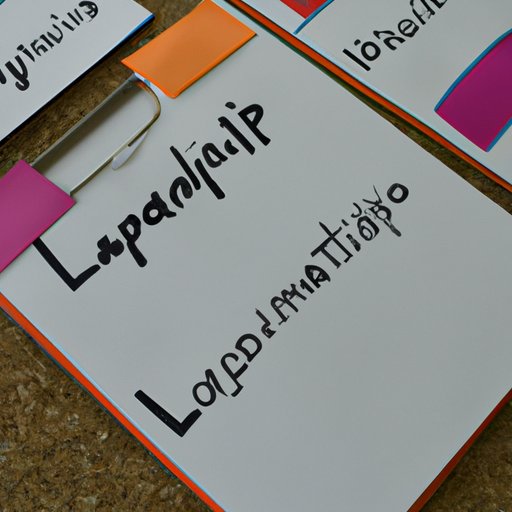Introduction
Leadership workshops are a great way to help develop the skills of a team or group of people. They can provide an opportunity for participants to learn new skills, gain insight into different perspectives and collaborate with others to solve problems. However, running a successful leadership workshop requires careful planning and preparation. In this article, we will explore the steps necessary for creating a comprehensive workshop that meets its objectives.

Outline the Goals and Objectives of the Workshop
The first step in planning a leadership workshop is to clearly define the goals and objectives. What is the purpose of the workshop? What are the desired outcomes? It is important to be as specific as possible when setting goals and objectives, so that everyone involved has a clear understanding of what they are trying to achieve.

Identify Relevant Leadership Topics to Cover
Once the goals and objectives have been established, the next step is to identify the relevant leadership topics that need to be covered. What topics should be included? How can you ensure that all key points are covered? It is important to consider the specific needs of the group and tailor the content accordingly.
Prepare Engaging Learning Activities
In order to keep participants engaged, it is important to prepare engaging learning activities. What kinds of activities will be best for the workshop? How can these activities be tailored to the specific goals of the workshop? Consider the age and experience level of the participants, as well as their interests and learning styles.
Choose Appropriate Facilitators
Another important factor in running a successful leadership workshop is to choose appropriate facilitators. What skills and qualities should facilitators possess? How can facilitators best engage with participants? The facilitator should be knowledgeable about the subject matter and be able to create an environment that encourages participation and collaboration.
Use Effective Communication Techniques
Communication is key when running a leadership workshop. What communication techniques should be used during the workshop? How can facilitators best ensure that everyone is heard? It is important to set ground rules for communication, such as no interrupting, no side conversations and no put-downs. Facilitators should also take the time to ask questions and listen carefully to participant responses.
Design a Comprehensive Evaluation Plan
Finally, it is essential to design a comprehensive evaluation plan for the leadership workshop. What metrics will be used to measure the success of the workshop? How can feedback be collected from participants in order to improve future workshops? Evaluations should include both quantitative and qualitative measures, such as surveys, interviews and focus groups.
Conclusion
Running a successful leadership workshop requires careful planning and preparation. By outlining the goals and objectives of the workshop, identifying relevant topics to cover, preparing engaging activities, choosing appropriate facilitators, using effective communication techniques and designing a comprehensive evaluation plan, you can ensure that your leadership workshop is a success.
(Note: Is this article not meeting your expectations? Do you have knowledge or insights to share? Unlock new opportunities and expand your reach by joining our authors team. Click Registration to join us and share your expertise with our readers.)
